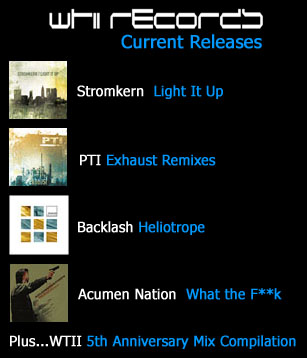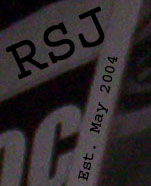|
Wax Trax. The very words conjure an image of the glory days of the industrial scene, with bands such as Ministry, KMFDM and
My Life with the Thrill Kill Kult all having called this label home. There's probably no more celebrated label in industrial
history, and though many have come after, there's never been one with more impact. Which is why at least one person was not
willing to let that history die. A former Wax Trax employee, Bart Pfanenstiel began his own label, WTII Records in 2001.
This year, WTII celebrates its fifth anniversary, as Bart hopes to keep the Wax Trax spirit alive in providing a home for
new and upcoming artists.
Rock Star Journalism: Let's start with some history. I think most people know you came from the original Wax Trax, but what
was your role while there?
Bart Pfanenstiel: I worked in the office for a long time; I started out as an intern back in '94. And then, basically,
I was there when TVT came in, and everybody I worked with was slowly gone. Then Jim [Nash] passed away and it was basically
Danny [Flesher] and I. So, I was, in a sense, the right hand man for him. I did a lot of stuff with working with the artists
from the Chicago side.
RSJ: What caused you to first want to form WTII?
BP: When everything with TVT went down, it seemed like we were just starting to get going with some of the European bands
and things like that. So, I just wanted to continue what we had started. I didn't want what was going on to die, so we started
this.
RSJ: Do you think the end of Wax Trax left a void for a certain kind of artist?
BP: Sort of. [By this time,] Metropolis had started to pop up and be a lot bigger than they were. But there's always
a void cause Wax Trax was Wax Trax.
RSJ: What do you think is the most important thing you learned from being a part of Wax Trax that you could apply to having
your own label?
BP: How to treat artists with respect. That, to me, is the most important thing, and that's what I like to try to do.
I understand the in and outs -- I don't want to be a bad person, and I try to do everything I can to get the music out there.
RSJ: Independent labels tend to cater to specific sounds, even within industrial. What do you want people to think of
when they hear the name WTII?
BP: I don't want to be pigeonholed at all. We have bands that go from a trip-hop sort of thing to more EBM stuff to Arcanta,
which is basically chanting in Sanskrit. Even some of the newer stuff [is different] -- Acumen Nation has a metal edge.
I want to be labeled as something that puts out good music, not as much pigeonholed as an EBM or industrial label.
RSJ: Would you consider something that wasn't industrial/electronic at all?
BP: Oh yeah, if it's good. I like putting out things that I like and that hopefully other people will like, and that's
kind of the way I look at it.
RSJ: What do you look for in a band you'd like to sign?
BP: If it's someone who's been around, obviously there's some sense of name recognition. That's why we did In Strict Confidence
first, cause it was something that people actually knew. With newer bands, I look for talent. The music is important; I'm
also a big lyrics person. If the lyrics are really emotional or moving that tends to really stand out for me. Also vocals
-- I think we're getting more towards the natural vocals, and away from the more distorted.
RSJ: Since there is another industrial label in Chicago with Invisible, what do you think WTII offers that sets you apart?
BP: I think we're more toward the now. I think they tend to do stuff that's a little more focused toward more of the
coldwave, I suppose you could say. We have a little bit more of the newer stuff.
 RSJ: What do you think an artist should be able to expect from a label?
BP: Good representation, support from the label. I think it's very important to support your artists and have artists
that believe you have the ability to help them and better them.
RSJ: You've mentioned in the past that you view touring as an artist's best avenue of promotion. Why do you think this
is so?
BP: To me, there's no better hands-on way to get to the fans. There's no better interaction than a band playing live
on stage. Seeing a band live kind of makes you go back into a CD and rediscover things you may not have heard the first time.
RSJ: In the past, you've held the WTII Minifest as a showcase for your bands. Do you have any plans to do something like
that again?
BP: We just turned five, so this is our anniversary year, and we're doing things for that. We have actually thought about
doing another Minifest. Nothing is set in stone, but we have talked about doing it again this year.
RSJ: Your releases are available through a variety of online outlets, but can be harder to find in stores. Would you
like to increase your presence in stores, or do you think the internet is a better way to go?
BP: I would love to increase our presence in stores, and we always try to. I also think the internet has more and more
of an impact, so we're definitely going to continue that route. But I don't want to disrespect the stores, cause they're
important as well.
RSJ: Some of your releases are also available through Metropolis mail order distribution. How did that come about?
BP: Actually, they're one of our accounts. They're pretty important with the mail order, so we go direct with them.
There's no hostilities or anything like that. It's part of getting it out there, and they have a good outlet, so we want
to take advantage of that. As much as maybe we fight over artists or things like that, we're all in the same business, and
we're all trying to do the same thing, so there's no point in creating hostility. That's why we have that bond with Positron,
which is Sister Machine Gun's label. They're sort of the same thing we are and we share resources. We're not joined together
or anything, but they scratch our back, we scratch theirs.
RSJ: You have a similar relationship with Artoffact, correct?
BP: We do a lot of stuff with Artoffact. They're associated with Storming the Base, and they carry our records up in
Canada. So, we help push their records here.
RSJ: As someone who has been involved in the industrial scene for a long time, what is the most dramatic change you've
seen?
BP: I think the scene itself has changed. I think there's just as many fans out there, but there's so many divisions
that people don't seem to be as focused as they were. Back in the day, people bought Wax Trax records because they were Wax
Trax records. It doesn't seem to be that way anymore.
RSJ: Is there anything that frustrates you about the current scene?
BP: I wish more people would come out to see more shows. I think there's a lot of great things out there, and people
seem to sometimes miss them. I wish that just for the artists' sake, people would support more.
RSJ: In the five years that you've been running WTII, what's been the most important thing to the success of the label?
BP: The fans. They're the ones that actually support us and buy our records. They help us move forward.
Got something to say about this feature? E-mail us.
|

